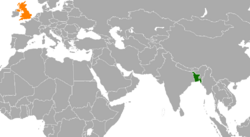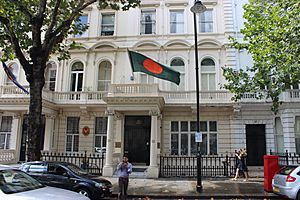Bangladesh–United Kingdom relations facts for kids
 |
|
Bangladesh |
United Kingdom |
|---|---|
Bangladesh–British relations are the friendly connections between Bangladesh and the United Kingdom. Both countries are part of the Commonwealth of Nations and the United Nations. This means they work together on many global issues.
Contents
A Look Back: History of Bangladesh and Britain
The relationship between Britain and Bangladesh goes way back to 1757. This was when the British took control of the Bengal region, which included what is now Bangladesh. This period is known as the British Raj.
During the Bangladesh Liberation War in 1971, Britain helped many people who had to leave their homes. The British government, politicians, and news outlets spoke out against the violence happening in Bangladesh. Some even showed support for the Mukti Bahini, who were fighting for Bangladesh's freedom.
On February 4, 1972, Britain officially recognized Bangladesh as an independent country. This encouraged other European and Commonwealth nations to do the same. Bangladesh then joined the Commonwealth on April 18, 1972.
Britain is home to the second-largest group of people from Bangladesh outside of Bangladesh itself. About 500,000 people of Bangladeshi heritage live in the UK. Most of them have family ties to the Sylhet region of Bangladesh. The Baishakhi Mela, a large Bangladeshi festival, is held every year in London.
In 1971, the famous musician George Harrison from The Beatles helped organize the Concert for Bangladesh. This concert raised money and awareness for Bangladesh. At the time, Bangladesh was suffering from floods, hunger, and the war. Millions of people, especially women and children, had to leave their homes. The concert was a huge effort to help people and also brought attention to UNICEF's work.
Modern Connections: How Bangladesh and Britain Work Together Today
In March 2008, Fakhruddin Ahmed, a leader from Bangladesh, visited the UK. He talked about increasing British investments in Bangladesh. They also discussed working together on defense and trade, especially on fighting terrorism. They also talked about making it easier for Bangladeshi goods to enter the UK market without extra taxes.
Britain is the biggest foreign investor in Bangladesh. It is also the third-largest buyer of goods from Bangladesh, after the USA and Germany.
At a security meeting in Singapore, Bangladesh's foreign advisor, Iftekhar Ahmed Chowdhury, met with the UK's Defence Minister, Des Browne. They discussed how their countries could work together on security and defense. Minister Browne hoped that Bangladesh's modern values would also reach the Bangladeshi community living in the UK.
British Bangladeshi Community
The Bangladeshi community in the UK has a strong media presence. There are five Bangladeshi TV channels and over 12 newspapers and magazines in Bangla and English. These media outlets help younger generations of British-Bangladeshis learn about their heritage and culture.
Important Visits Between Leaders
Many important people have visited between Bangladesh and the UK over the years. The first British Foreign Secretary to visit Bangladesh was Sir Alec Douglas-Home in June 1972.
The first British Prime Minister to visit Bangladesh was James Callaghan in 1978. Later, John Major visited in 1997, and Tony Blair in 2002. Leaders from Bangladesh, like Sheikh Mujib, Ziaur Rahman, and Fakhruddin Ahmed, have also visited the UK.
Bangladesh's Prime Minister, Sheikh Hasina, visited the UK in January 2011. She had important talks with British Prime Minister David Cameron.
Her Royal Highness The Princess Royal, Princess Anne, visited Bangladesh in March 2011. This was her fourth visit. During her trip, Princess Anne met with the President, the Prime Minister, and other important people in Bangladesh.
Prime Minister Sheikh Hasina visited the UK again for the Girl Summit in London. This was her first visit to a Western country after the 2014 elections in Bangladesh. She highlighted the strong relationship between Bangladesh and the UK.
British Help for Bangladesh
Bangladesh and the UK worked together to organize the London Climate Change Conference in September 2008. The main goal was to show Bangladesh's plans to deal with climate change. It also aimed to help Bangladesh prepare for its effects. The conference also set up a special fund for Bangladesh. The UK promised £75 million (about $125 million) over five years to help Bangladesh with climate change programs.
In 2009, the UK's development aid to Bangladesh was $216 million. This increased to about $250 million in 2010. The Department for International Development (DFID) announced it would spend £1 billion (about $1.66 billion) in Bangladesh between 2011 and 2015. This means an average of £250 million (about $415 million) per year. Even with global financial problems, the UK's help to Bangladesh has grown a lot. Since Bangladesh became independent, the UK has given about £3 billion in aid.
Trade and Business Between the Countries
Trade in goods and services between Bangladesh and the UK grew by over 119% between 2007 and 2012. In 2013, the UK sold £450 million worth of goods and services to Bangladesh. Most of this was services. In 2014, the UK exported £131 million worth of goods. These goods included things like medical equipment, machinery, and electrical items.
The UK is the third-largest buyer of goods from Bangladesh. Bangladesh's exports to the UK have been growing steadily each year. In 2010-11, Bangladesh sold $2.001 billion worth of goods to the UK. This was 33% more than the year before.
Many British companies operate in Bangladesh. Some well-known ones include HSBC, Standard Chartered, Unilever, and GlaxoSmithKline.
The UK is also one of the top sources of money sent back home by Bangladeshis living abroad. It is currently the fifth-largest source of these payments. Between 2009 and 2011, about $890 million was sent from the UK to Bangladesh.
In the 2012-13 financial year, Bangladesh exported $2.2 billion worth of goods to the UK. It imported $2 billion worth of goods and services from the UK.
Working Together on Defence and Security
The UK has faced terrorist attacks, like the London bombings on July 7. Because of this, Bangladesh and the UK work very closely on fighting terrorism. Both governments are trying to improve their cooperation in this area.
The first meeting of the Bangladesh-UK Joint Working Group on Counter Terrorism happened in Dhaka in June 2009. This group helps the two governments talk and share ideas. They identify ways to improve cooperation, find new areas to work together, and share best practices. This includes training and sharing information.
Defence and security cooperation between Bangladesh and the UK is strong. The UK helps a lot with training the Bangladeshi Armed Forces. Many Bangladeshi military personnel train in the UK at places like the Sandhurst Royal Military Academy. The UK has also helped set up important military colleges in Bangladesh.
The navies of both countries also work closely. Many ships used by the Bangladesh Navy were bought from the Royal Navy. The two armed forces also cooperate in United Nations Peacekeeping Operations and in fighting global terrorism. High-level military officials from both countries visit each other often. This strong cooperation is expected to continue growing.
See also
- British Bangladeshi
- History of Bangladeshis in the United Kingdom
- British Council Bangladesh
 | Charles R. Drew |
 | Benjamin Banneker |
 | Jane C. Wright |
 | Roger Arliner Young |


